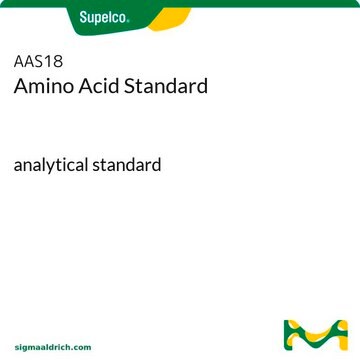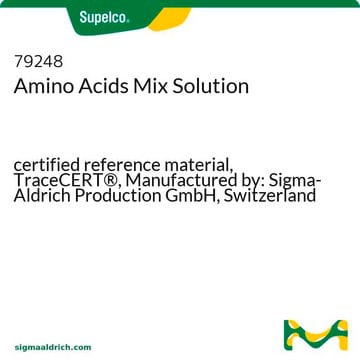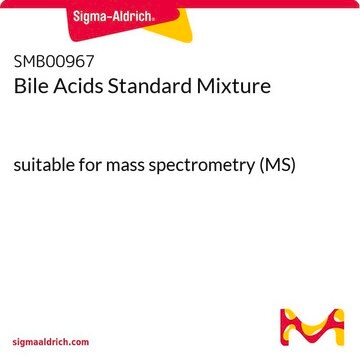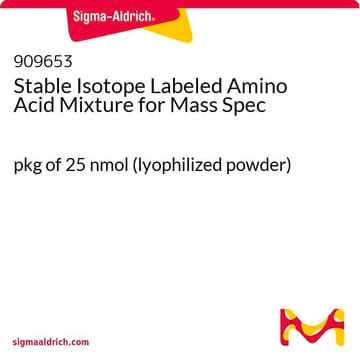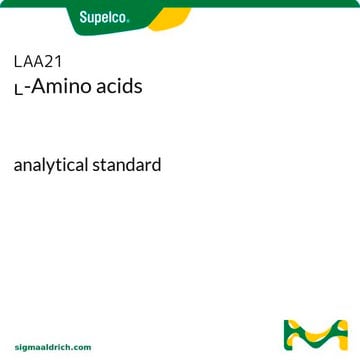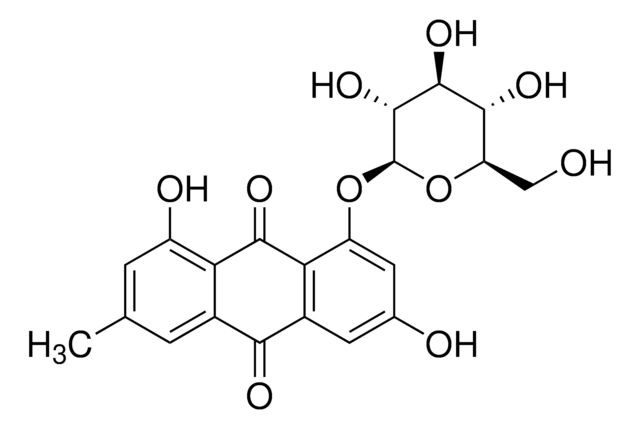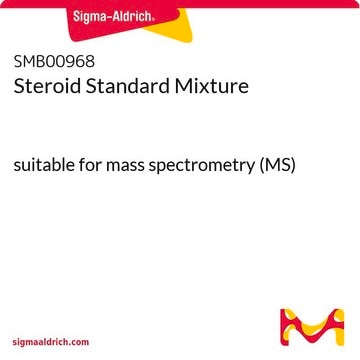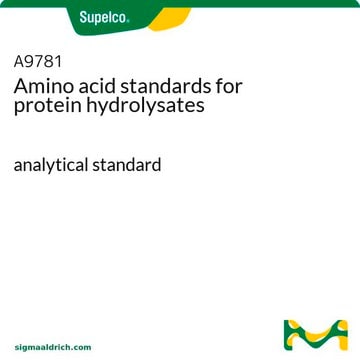SMB00917
Deuterated Amino Acid Standard Mixture
suitable for mass spectrometry (MS)
Synonym(s):
Deuterated Amino Acid Standard Mixture, AA mixture, Amino Acids mixture
Sign Into View Organizational & Contract Pricing
All Photos(1)
About This Item
UNSPSC Code:
41116107
NACRES:
NA.21
Recommended Products
form
liquid
Quality Level
IVD
for in vitro diagnostic use
technique(s)
mass spectrometry (MS): suitable
application(s)
metabolomics
shipped in
wet ice
storage temp.
2-8°C
Related Categories
Application
The Deuterated Amino Acid Standard Mixture is formulated for use as a concentration standard for high throughput LC/MS or GC-MS metabolomic analysis.
Features and Benefits
- All deuterated amino acids are dissolved in water and ready to use. Total vial volume of 10 ml.
- Ready to use deuterated internal standards.
- Ideal for polar metabolites for HILIC chromatography.
Analyte
Description
Glycine (D5)
L-Histidine (D5)
L-Serine (2,3,3-D3)
L-Alanine (2,3,3,3-D4)
L-Isoleucine (D10)
L-Threonine (D5)
L-Arginine (D7)
L-Leucine (D10)
L-Tryptophan (D8)
L-Asparagine (2,3,3-D3)
L-Lysine (D8)
L-Tyrosine (D7)
L-Aspartic acid (2,3,3-D3)
L-Methionine (D8)
L-Valine (D8)
L-Cystine (3,3,3′,3′-D4)
L-Ornithine (5,5-D2)
PI-Methyl-L-Histidine (D3)
L-Glutamic acid (2,3,3,4,4-D5)
L-Phenylalanine (D8)
TAU-Methyl-L-Histidine (D3)
L-Glutamine (2,3,3,4,4-D5)
L-Proline (D7)
DL-Homocysteine (3,3,4,4-D4)
See All (24)
Storage Class Code
12 - Non Combustible Liquids
WGK
WGK 1
Flash Point(F)
Not applicable
Flash Point(C)
Not applicable
Choose from one of the most recent versions:
Certificates of Analysis (COA)
Lot/Batch Number
Don't see the Right Version?
If you require a particular version, you can look up a specific certificate by the Lot or Batch number.
Already Own This Product?
Find documentation for the products that you have recently purchased in the Document Library.
Oliver Fiehn
Current protocols in molecular biology, 114, 30-30 (2016-04-03)
Gas chromatography-mass spectrometry (GC-MS)-based metabolomics is ideal for identifying and quantitating small-molecule metabolites (<650 Da), including small acids, alcohols, hydroxyl acids, amino acids, sugars, fatty acids, sterols, catecholamines, drugs, and toxins, often using chemical derivatization to make these compounds sufficiently
Dinesh K Barupal et al.
Metabolites, 9(5) (2019-05-28)
Mouse knockouts facilitate the study ofgene functions. Often, multiple abnormal phenotypes are induced when a gene is inactivated. The International Mouse Phenotyping Consortium (IMPC) has generated thousands of mouse knockouts and catalogued their phenotype data. We have acquired metabolomics data
Our team of scientists has experience in all areas of research including Life Science, Material Science, Chemical Synthesis, Chromatography, Analytical and many others.
Contact Technical Service